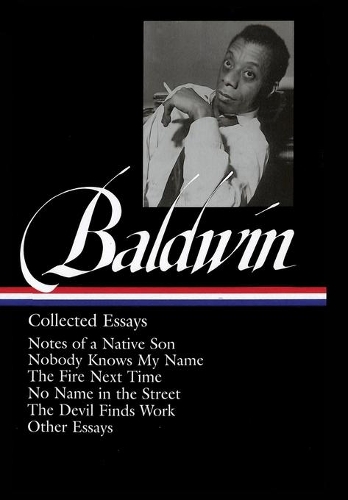
James Baldwin: Collected Essays: Notes of a Native Son / Nobody Knows My Name / The Fire Next Time / No Name in the Street / The Devil Finds Work (LOA#98)
(Hardback)
Available Formats
Hardback
Published: 28th April 2019
Hardback
Published: 7th March 2025
Hardback
Published: 1st February 1998
Hardback
Published: 1st February 1998
Hardback
Published: 15th January 2017
Paperback
Published: 15th February 2015
Publishing Details
James Baldwin: Collected Essays: Notes of a Native Son / Nobody Knows My Name / The Fire Next Time / No Name in the Street / The Devil Finds Work (LOA#98)
By (Author) James Baldwin
Edited by Toni Morrison
The Library of America
The Library of America
1st February 1998
1st February 1998
United States
Classifications
Physical Properties
Hardback
869
Width 130mm, Height 208mm
Description
James Baldwin was a uniquely prophetic voice in American letters. Hisbrilliant and provocative essays made him the literary voice of the Civil Rights Era, and they continue to speak with powerful urgency to us today, whether in the swirling debate over the Black Lives Matter movement or in the words of Raoul Peck's documentary "I Am Not Your Negro."Edited by Nobel laureate Toni Morrison, the Library of America's Collected Essays isthe most comprehensive gathering of Baldwin's nonfiction ever published. With burning passion and jabbing, epigrammatic wit, Baldwin fearlessly articulated issues of race and democracy and American identity in such famous essays as "The Harlem Ghetto," "Everybody's Protest Novel," "Many Thousands Gone," and "Stranger in the Village." Here are the complete texts of his early landmark collections, Notes of a Native Son (1955) and Nobody Knows My Name (1961), which established him as an essential intellectual voice of his time, fusing in unique fashion the personal, the literary, and the political. "One writes," he stated, "out of one thing only-one's own experience. Everything depends on how relentlessly one forces from this experience the last drop, sweet or bitter, it can possibly give." With singular eloquence and unblinking sharpness of observation he lived up to his credo- "I want to be an honest man and a good writer." The classic The Fire Next Time (1963), perhaps the most influential of his writings, is his most penetrating analysis of America's racial divide and an impassioned call to "end the racial nightmare...and change the history of the world." The later volumes No Name in the Street (1972) and The Devil Finds Work (1976) chart his continuing response to the social and political turbulence of his era and include his remarkable works of film criticism. A further 36 essays-nine of them previously uncollected-include some of Baldwin's earliest published writings, as well as revealing later insights into the language of Shakespeare, the poetry of Langston Hughes, and the music of Earl Hines. LIBRARY OF AMERICAis an independent nonprofit cultural organization founded in 1979 to preserve our nation's literary heritage by publishing, and keeping permanently in print, America's best and most significant writing. The Library of America series includes more than 300 volumes to date, authoritative editions that average 1,000 pages in length, feature cloth covers, sewn bindings, and ribbon markers, and are printed on premium acid-free paper that will last for centuries.
Reviews
"Baldwin's impassioned essays have been at least as influential as his novels in exposing the racial polarization of American society. This massive compilation reproduces in their entirety his early essay collections Notes of a Native Son (1955), Nobody Knows My Name (1961), The Fire Next Time (1963) as well as his later, less successful book-length essays: the pessimistic, doom-laden No Name in the Street (1972) and The Devil Finds Work (1976), a semi-autobiographical gloss on American movies. The book charts his trajectory from eloquent voice of the civil rights movement to disillusioned expatriate increasingly prone to grandiloquence and angry rhetoric. Also included is a miscellany of 36 articles, polemics and reviews, 26 of which were previously collected in The Price of the Ticket (1985), published just two years before Baldwin's death from cancer in France at age 63. Novelist Morrison's editing of this omnibus, which includes a chronology and notes, should help rekindle interest in Baldwin, whose recurrent themesthe African American search for identity, the hypocrisy of white America, the urgent necessity for lovemake his work timely and challenging. BOMC and Reader's Subscription selections."Publishers Weekly
Author Bio
With the novelGo Tell It on the Mountain(1953), a distillation of his own experiences as a preacher's son in 1930s Harlem, and the essay collectionNotes of a Native Son(1955),James Baldwin(1924-1987)established himself as a prophetic voice of his era. Some such voices may grow fainter with the passage of time, but Baldwin remains an inescapable presence, not only a chronicler of his epoch but a thinker who helped shape it. Toni Morrison, volume editor, is the author of a number of award-winning novels, including Love, Jazz, Beloved, Song of Solomon, Sula, and The Bluest Eye. She was awarded the Nobel Prize for Literature in 1993.
